
Recently on Cyclingnews.com |
Tech feature: Specialized 2008 road lineup, July 2, 2007
Hitting the Tarmac with Specialized for 2008
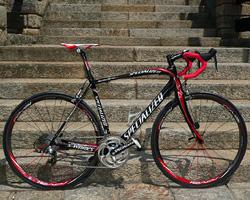
|
Another year brings another Specialized product introduction, which now slides over a couple of European countries to Navacerrada, Spain, just outside of Madrid. As usual, Specialized's engineers and designers have been steadily beavering away over the last year (or more!) to bring yet another impressively overhauled lineup for 2008. Cyclingnews Technical Editor James Huang covers road bikes and equipment this time around, with off-road and women's equipment (along with other stuff!) to follow in the days ahead.
Tom Boonen's bike for the masses
We already managed a sneak peek at the new Specialized S-Works Tarmac SL2 captained by Tom Boonen (Quickstep-Innergetic) during the Critérium du Dauphiné Libéré, and the good news is that Specialized has now officially introduced the bike as a production model for 2008. The new bike still isn't quite exactly the same as what 'Tornado Tom' rides (Boonen's machine features a fully custom front triangle with a longer head tube and a unique fiber lay-up schedule with additional plies for added rigidity), but should still offer the same basic message and changes relative to the extant S-Works Tarmac SL which will continue to be available.
According to Specialized, the Tarmac SL2 was built specifically in response to requests from Boonen and teammate Paolo Bettini for the "stiffest, fastest, most efficient, and best handling bike." In response, designers targeted bottom bracket rigidity, torsional stiffness, and vertical compliance as the main goals for the project.
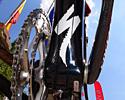
|
The resultant FACT IS (Integrated Structure) chassis uses more high modulus carbon fiber and is built with a new FACT 11r construction method that blends monocoque and Specialized's Az1 wrapped-joint technology. Bottom bracket and torsional rigidity are gained through an enormous down tube, exceptionally tall chain stays that take a straighter path from the bottom bracket shell to the carbon dropouts, a square-profile seat tube, and a wide and flat top tube.
Up front, the new SL2 carbon fork now flares from 1 1/8" at the stem to 1 ½" at the crown for more precise handling, increased strength, and lighter weight. As an added benefit, the similarly flared head tube also allows for a larger junction with the down tube for even more stiffness. Frame designer Luc Callahan also shifted the lower headset bearing up inside the head tube by 12mm for improved front-end impact and fatigue strength as loads are now transferred directly into the wall of the down tube.
In spite of the roughly 30% increase in bottom bracket stiffness (according to Specialized), the new Tarmac SL2 somewhat miraculously is also reported to offer 10% more vertical compliance than the previous model, making it more efficient and more comfortable. To sweeten the pot, the SL2 is even about 100g lighter than the SL. Claimed weight for a 56cm bare frame is 952g; the matching fork is 350g with an uncut steerer.
Boonen's other bike for the masses
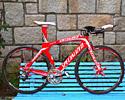
|
Boonen is renowned for his successes in both sprint finishes and one-day events, but apparently the Belgian superstar also feels he has a legitimate shot at scoring a win at the upcoming Tour de France prologue in London. To aid him in his quest, Specialized also unveiled an all-new (and rather striking) S-Works Transition TT/Tri platform.
The new frame uses NACA-designed airfoil shapes for the FACT 9r N'Aero tube set, including the down tube, seat post, and seat stays. The seat- and chain stays adopt a dramatically tucked-in profile as they head towards the rear wheel to 'hide' them from the wind, and as is fast becoming convention, the rear wheel is closely profiled by the seat tube.
Up front, the approaching air first sees the narrow 1" alloy steerer on the N'Aero carbon fork (and matching hourglass-shaped head tube) which incorporates a unique crown shape and leg profile. Small 'speed gussets' (whose name cleverly implies that they are structural elements to satisfy UCI requirements) located on the down tube just aft of the fork are said to smooth airflow passing through the crown, while the steeply sloping top tube supposedly does the same job for air coming off the back of the bar and stem.
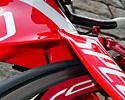
|
Specialized also incorporates a proprietary braking system for the new Transition which uses a more aerodynamic center-pull dual-pivot configuration (think old U-brake) and aero-sculpted calipers. Naturally, all cables are routed fully internally, but mechanics can breathe a sign of relief: a set of four pre-installed nylon tubes route each line to its respective location so no fishing (or cursing) will be required. Full housing is used throughout for ease of assembly and protection from corrosive sweat, water, and grime. What's the fourth tube for, you ask? To route your SRM power meter wire, of course! Splicing is required, but it still provides a clean and slippery appearance.
Specialized will offer the Transition with both a straight and layback post (each with a forward and rearward position) to satisfy the triathlon and ProTour ranks alike. Claimed frame weight is approximately 1500g.
Up and down, and up and down, and up and down…
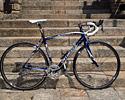
|
We only managed to sample a single day on the new SL2, but the difference in overall feel between it and Specialized's S-Works Roubaix SL (which is no slouch in its own right) is still immediately obvious nonetheless. The new Tarmac doesn't quite possess the Roubaix's ultra-buttery ride (it's not far off, though, at least on smaller stuff), but the stiffer chassis is noticeably more responsive in all conditions, be it climbing, descending, climbing, sprinting, or climbing (it's quite hilly here!). Turn-in is also dramatically quicker, and the entire machine exudes a level of overall directness that should undoubtedly satisfy racers.
We'll be sure to get our hands on a long-term test machine soon enough and will provide a more in-depth report on the Tarmac SL2's performance in the coming weeks and months ahead. In the meantime, on to Specialized's 2008 off-road lineup…
Photography
For a thumbnail gallery of these images, click here
Images by James Huang/Cyclingnews.com
- The new Specialized S-Works Tarmac SL2 is stiffer, lighter and even more comfortable than the current model, at least according to Specialized.
- As compared to the standard Tarmac SL , the SL2 boasts drastically oversized tubing.
- Chain stays on the Tarmac SL2 run nearly the full height of the bottom bracket shell.
- Seat stays are kept relatively small to help maintain comfort.
- A curved top tube provides a leaf spring effect for more vertical compliance.
- The oversized and tapered head tube flows smoothly into the new SL2 fork.
- A 1.5" lower headset bearing makes for a lighter, stiffer, and stronger fork and also adds surface material to mate to the down tube.
- A bigger head tube naturally yields a larger logo!
- Cane Creek provides a custom headset for the new 1 1/8"-to-1 1/2" standard.
- The giant down tube runs the full width of the bottom bracket shell.
- Seat stays take a more direct path down to the dropouts.
- The Tarmac SL2 seat tube transitions from round to square down at the bottom bracket shell.
- Bigger tubes provide a bigger canvas ; observers will easily be able to identify this machine from a distance.
- Carbon fiber dropouts are sandwiched with protective metal plates.
- The larger diameter lower steerer tube on the new SL2 fork allows for straighter carbon fibers.
- A stainless steel crown race is permanently bonded to the steerer tube.
- Fork dropouts are bonded aluminum.
- The S-Works Tarmac SL2 will be available in team colors.
- SRAM will receive healthy spec on Specialized's new bikes , including the new Red group (which sadly has yet to show its face in person).
- The new S-Works Transition will help propel Tom Boonen during the London prologue.
- Deep-section carbon tubing is used throughout the new Transition frame.
- A narrow hourglass-shaped head tube houses the 1" alloy steerer on the N'Aero fork.
- Speed gussets' supposedly help smooth the airflow coming through the fork crown.
- The raised top tube looks a bit unusual but is said to help smooth airflow coming off the back of the stem.
- A deep-section aero post will be offered in two offsets, each of which will have two setback options.
- Sharp aero profiles characterize the rear of the seat cluster as well.
- Specialized draws a unique path for the chain stays and seat stays, which run roughly parallel to the centerline of the bike until just before the rear dropouts.
- Not surprisingly, the seat tube closely follows the arc of the rear wheel.
- Seat stays and chain stays take a dramatic turn at the dropouts, and even the kink is aero-profiled.
- A clean wedge-type seatpost binder graces the Transition.
- Proprietary dual-pivot center-pull brakes offer a narrower and cleaner profile than conventional calipers (covers for the pivot hardware was missing on this example).
- The rear brake is located behind the bottom bracket shell in a sheltered area for minimal impact on aerodynamics.
- All of the cables are cleanly routed through fully guided nylon tubes just behind the head tube.
- A Zipp Vuka Aero integrated carbon fiber aero bar will come as standard equipment on the complete S-Works Transition.
- Last year's excellent S-Works Roubaix SL carries on unchanged for 2008.

